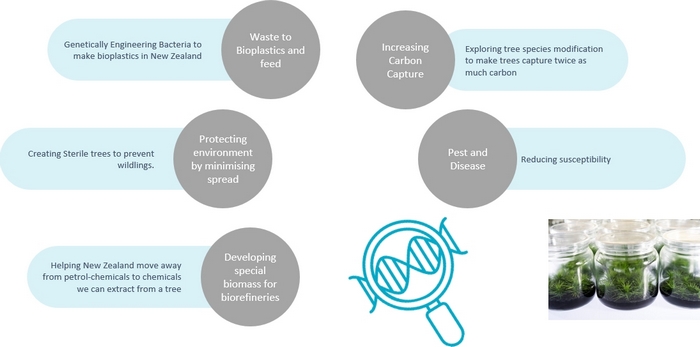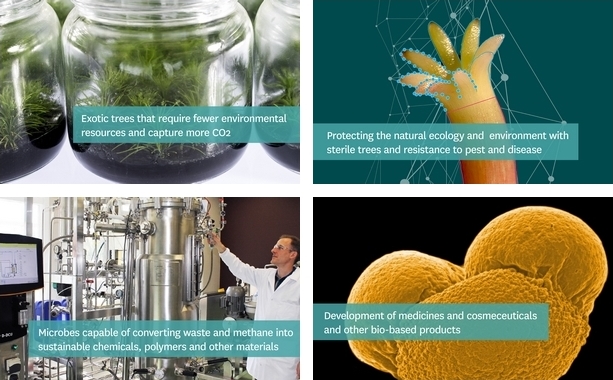Genetic engineering
Welcome to the Scion webpage dedicated to genetic engineering (gene modification). Scion is a responsible organisation committed to aiding New Zealand in transitioning from a linear economy model towards a circular bioeconomy. Our focus is on renewable resources, waste reduction, environmental conservation, and societal benefits.
In light of the challenges posed by limited resources, climate change and biodiversity loss, we believe that innovative and alternative solutions are necessary to bring about positive change. Genetic modification (GM) is a field that offers potential solutions to many difficult problems; some where there is currently no viable alternative. At Scion, we employ a range of GM technologies, including gene editing and transgenic methods, which we believe are crucial tools to support New Zealand’s future.
We understand the importance of safety and regulatory compliance in the work we do - all our research involving New Organisms is carried out in Physical Containment laboratories under the regulations set by the Environmental Protection Authority (EPA).
We are proud of our ongoing research and development efforts in genetic engineering, and we are committed to working towards a more sustainable future for New Zealand. We invite you to explore and to learn more about our work and our commitment to sustainable solutions.
Genetic modification at Scion
Genetic modification has many applications. Our current GM research involves exotic tree species such as radiata pine and Douglas-fir, and a variety of non-pathogenic bacteria and yeast species. Internationally, we are at the forefront in applying GM to radiata pine and other conifers. There is considerable opportunity for New Zealand to benefit from our knowledge and research outcomes. We use GM to understand their biology to unlock their potential:

- Find out how geneticists plan to identify and modify genes to control the spread of wilding pines [YouTube]
- Strategies for engineering reproductive sterility in plantation forests [scientific article]
- Enhancing the availability of sugars and other chemicals to assist with generation of more sustainable products
- Trees that capture more carbon and reduce utilisation of herbicides and insecticides
- Fermentation processes that convert C1 gasses (methane, carbon dioxide), agro-industrial wastestreams, and low valuable streams into energy, commodities, and high value products
- Take a look at a survey of New Zealanders’ awareness, attitudes, and understanding of genetic technologies
101 gene editing on Douglas-fir
Dr. Glenn Thorlby participated in the Wilding Pine Network webinar series to provide a snapshot of what gene editing is and Scion’s research on producing sterile Douglas-fir trees. Wilding conifers are a problem when the trees grow in unwanted areas. To prevent spread, a gene editing technique with CRISPR was used to engineer non-coning trees. Watch to learn more about this research.
Field Trials of genetically modified trees
Field trials with GM Pinus radiata are ongoing at Scion in a 4 ha containment site. Under current regulations, this field trial was approved by the EPA (formerly ERMA) in 2010 and is the only plant GM field trial currently operating in New Zealand. This research will continue through to 2035.
For more information, read the EPA HSNO application.
Industrial Biotechnology
Scion is also leading New Zealand in fermentation technology, utilizing bacteria and yeast to convert agro-industrial wastestreams into high-value products. We are developing bioplastics from sustainable sources, reducing the need for petrochemical products.
Our scientists are using synthetic biology, to develop new materials, chemicals and other bio-based products.
This work translates to applications ranging from CleanTech to new medicines.
Māori perspective on Scion’s genetic modification work
Scion has a long history of consultation with tangata whenua regarding our work with genetic modification. This began in the early 1990s when Scion consulted with several hāpu of te iwi o Ngati Whakaue whose ancestral boundaries include the land on which Scion’s campus is located. This strong relationship has included tangata whenua involvement in the Scion’s applications to carry out field trials with genetically modified trees and support with and monitoring of the trials themselves.
Another outcome of this relationship is the development by a Māori Masters student of the brochure: Te Maramantanga o Te Tipuranga (which translates as "understanding (maramatanga) of growth (tipuranga)”). The brochure describes Scion’s field test research, written specifically for Māori and taking Māori concerns around genetic modification into account.
Scion values the relationships that we have established and Scion continues to deepen the relationship with Ngā Hapū e Toru, as tangata whenua.
More Information
For more information on our GM research, field trials, and commercial applications, please refer to the links provided. We hope to continue supporting informed discussion on GM technologies and their potential impact on modern society and New Zealand.
Contact
Glenn Thorlby, Scientist, Quantitative Genomics
Alec Foster, Portfolio Leader, Sustainable Materials

